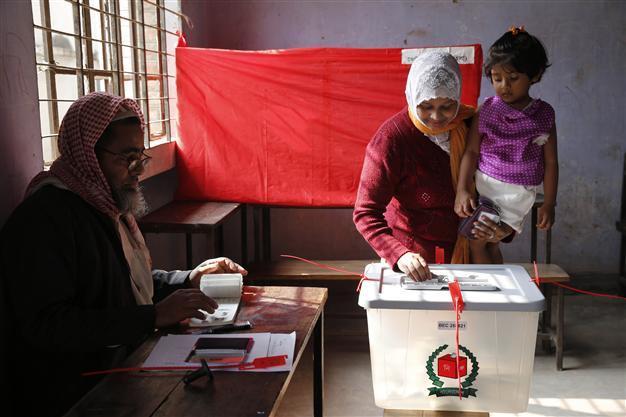18 dead, polling booths firebombed as Bangladesh votes
DHAKA - Agence France-Presse

Bangladeshi woman casts her vote, at a polling station in Dhaka, Bangladesh, Sunday, Jan. 5, 2014. aP Photo
Thousands of protesters firebombed polling stations and at least 18 people were killed as violence flared across Bangladesh Sunday during a walkover election boycotted by the opposition.
Police said they had opened fire at protesters as they torched more than 200 polling stations and stole and burnt ballot papers to try to sabotage the poll.
Two of those killed were beaten to death while guarding polling stations in northern districts but most of the victims were opposition supporters.
"We've seen thousands of protesters attack polling booths and our personnel at a number of locations with petrol bombs," Syed Abu Sayem, police chief of the northern district of Bogra, told AFP.
"The situation is extremely volatile," he added after describing how thousands of ballot papers had been ceremoniously set on fire.
Most of the other victims were opposition activists shot by police, while a driver died of his injuries from a petrol bomb attack on his truck.
"We were forced to open fire after thousands of them attacked us with guns and small bombs," said Mokbul Hossain, police chief in the northern town of Parbatipur.
"It was a coordinated attack. They managed to seize some ballot papers and they tried to steal our weapons." In the capital Dhaka, whose streets were largely empty apart from thousands of troops, police confirmed three petrol bombings of polling stations.
Tens of thousands of troops were deployed across the country after around 150 people had been killed in the build-up to the election, but they failed to stem the bloodshed.
The ruling Awami League has accused the main opposition Bangladesh Nationalist Party (BNP) of orchestrating the violence and has kept its leader under de facto house arrest.
The opposition had demanded that Prime Minister Sheikh Hasina make way for a neutral caretaker government before the election to ensure no ballot-rigging, a system in force in the past. It staged weeks of deadly protests, including transport blockades and calls for strikes, to press its demands. With the opposition trying to enforce a general strike as part of its strategy to wreck the polls, officials acknowledged the turnout was poor.
"The turnout was low, partly due to the boycott by many parties," said election commission chief Kazi Rakibuddin Ahmad, without immediately giving a figure.
Polls closed at 4:00 pm (1000 GMT) after eight hours of voting. Counting began soon afterwards and final results are expected in the early hours of Monday.
AFP correspondents said there were no queues to vote, while local television reported that only a single person voted in the first three hours at one station.
The outcome is not in doubt as voting took place in only 147 of the 300 parliamentary constituencies. Awami League candidates or allies had a clear run in the remaining 153.
Hasina's government says it had to hold the vote after parliament's five-year term expired.
"It's a victory for democracy," senior leader of the ruling party Tofael Ahmed told reporters, accusing the opposition of fomenting an atmosphere of fear.
"They did not hesitate to kill even an innocent child," he said. The BNP, whose leader Khaleda Zia has been confined to her home for a week, said the vote was a joke.
"The country has rejected these farcical elections which were meaningless, laughable and universally unacceptable," said deputy leader Fakhrul Islam Alamgir.
Those who did vote showed little enthusiasm.
"I don't really want to vote as I don't think it's a proper election with only the ruling party candidates participating," Anwar Hossain said outside a polling station in Dhaka's Azimpur neighbourhood.
"But I am scared about what might happen if I don't as the candidates might think I am anti-Awami League." Shopkeeper Niyamat Ullah said it was a pointless exercise.
"What kind of election is it when there's only a handful of voters at the polling centre and the two candidates are from the same party?" Analysts warn the election will likely stoke violence after the bloodiest year of unrest since Bangladesh broke free from Pakistan in 1971.
The former East Pakistan is the world's eighth most populous nation but also one of the poorest in Asia, and more turmoil will undermine efforts to improve the lot of its population of 154 million -- a third of whom live below the poverty line.
A local rights group says more than 500 people have been killed since January 2013, including victims of clashes that erupted after the conviction of Islamists for crimes dating back to the 1971 war.
The main Islamist party was banned by judges from taking part in the election, and its leaders are either in detention or in hiding.
Alarmed by the violence, the United States, European Union and Commonwealth all declined to send observers to Sunday's election.
Bangladesh has been plagued by instability since independence, with nearly 20 coups since 1975.
